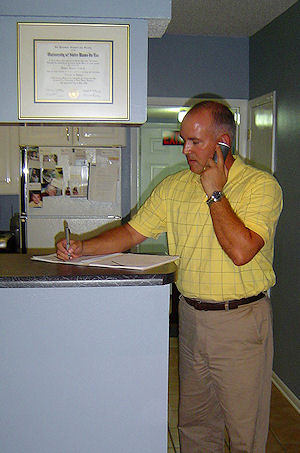"Physical therapy in Alabama, unlike 48 other states, requires a physician referral for people to receive PT services." That's right. You can go get a massage or see a physical-coach trainer without physician involvement, but for a highly trained clinician in the physical movement science, you must go through a gate-keeper! Physicians do refer for PT, so what is behind the door of that PT? "What physical therapy does is dependent on what the problem is, what the diagnosis is. To some extent it is also dependent on the kind of PT clinic you go to. Basically, PT is a movement science which applies movement patterns to overcome physical limitations and disease processes." The expectation is that an assessment with a one-on-one focus will address the presenting problem and ameliorate it.

And that gets us to problems. Not all physical problems are our own making, but many of them are. Zitnik discussed a number of simple steps which not only can improve our general health and wellness, but actually help minimize our existing health problems. You may be surprised:
-
Quit smoking or cut back substantially on use of nicotine. "Low back pain takes twice the amount of healing time for smokers as non-smokers!"
- Drink more water. "Many of the things we take in each day require water to metabolize, and we are not getting the water into our bodies to run our organs properly."
- Get regular exercise. "The problem with each generation is that we get more adept at engineering out the things in our environment that use our muscles. The result is we are exercising less and less as a culture," Zitnik explains.
- Get the sleep you need. "Our bodies need time for rest and recovery nightly in order to refuel and repair our body systems."
- Know your medicines. "We live in a time when people take drugs without understanding what they are for. The average drug has three side effects. And each drug may need adjustments as we age." The message? Be proactive in knowing what you are putting in that body of yours.
- Keep a balance in your exercise schedule. Zitnik is a practical man with this advice. He says, "Do what you can, not what you can't. Don't expect too much of yourself when it comes to exercise, but have reasonable expectations."
Exercise is typically broken down into three categories, building strength, improving cardiovascular function, and stretching. We need elements of all three in our lives. "Erosion of bone density is a problem we usually associate with women, but 20% of men will have similar problems at time of retirement. We need exercise to keep healthy bones--exercise is not just muscle-related, because it affects bones and organs," Zitnik notes.
A common problem with aging relates to the stooping posture we often associate with the elderly. "Many things in our daily living ultimately 'shorten' the muscles of the chest. The failure in maintaining those muscles ultimately affects orientation of the shoulders and the rotator cuff of the shoulders, which accounts for many shoulder complaints in the elderly. But the rotator cuff problem is concomitant with that stooped posture," Zitnik explained. There are other issues that present with aging, e.g., knee deterioration, cervical spine issues, and the like. "What we see as we age, however, is that there is a cascade of posture-related complaints that we can address before they become overt problems by proper exercise." (The Zitnik clinic does have therapy strategies for these maladies.)
So, what can the average person do when it comes to exercise? "Simply walking is the most under-used exercise we have. Swimming or just being in a pool and walking in neck level water, is good. In fact, using a pool for exercise takes lots of weight stress off of joints that have problems.
Several questions were addressed from the "710" audience:
-
"Must a person gain access to PT services only through a physician?" In Alabama the answer is "yes." Physicians and PTs have a common health care concern and they communicate readily. In fact, physicians and PTs work closely with one another, so this access issue is not a major problem for the health care consumer.
- "If regular exercise is good, what if you haven't done anything for a long time?" Exercise will help many problems. It is never too late to get started, but you have to begin. You do what you can do. Listen to your body about overdoing it, and just stop if your body tells you that you are doing too much.
- "What about starting a running program?" Running is a good exercise, but as we age, our knees and hips become at risk. We need to listen to our body. Aches and pains related to exercise are telling us what is too much. Gentle repetition will accomplish what a strenuous program cannot.
Rick Zitnik's PT practice is located at 17773 Highway 104 in Robertsdale. His clinic may be reached at (251) 947-7930.